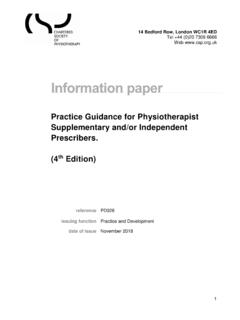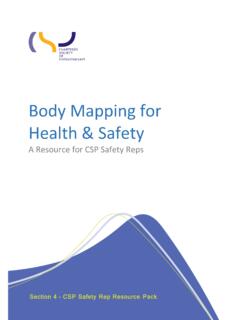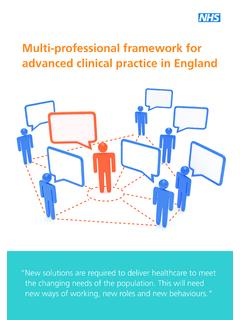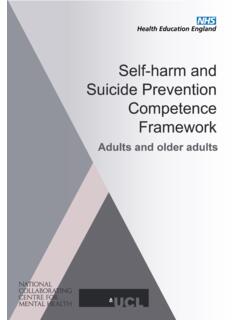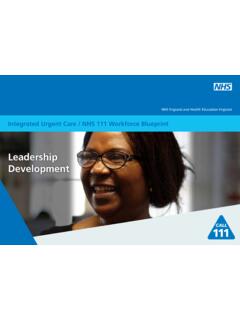Transcription of Musculoskeletal Framework - Chartered Society of …
1 1 Musculoskeletal core capabilities Framework for first point of contact practitionersPublic HealthEngland2 AcknowledgementsThis Framework was commissioned by Health Education England and NHS England, building upon work previously undertaken by the national programme delivered by the Arthritis and Musculoskeletal Alliance (ARMA) and its member of the Framework was steered by a project management group chaired by Professor Anthony Woolf (chair of ARMA) and informed by a Delphi research project led by Dr Mike Backhouse and Ken Chance-Larsen (University of Leeds) and by focus groups of patients.
2 Project management was provided by Colin Wright and Hilary Wyles (Skills for Health).We are extremely grateful to members of the project management group for providing their guidance, expertise and support. In particular, assistance in refining the final draft was provided by Dr Richard Collier (Health Education England), Dr Sally Gosling ( Chartered Society of Physiotherapy), Dr Josephine Erwin (Royal Cornwall Hospitals NHS Trust), Dr Mike Backhouse and Ken Chance-Larsen (University of Leeds). The project management group included representatives of the following organisations.
3 Arthritis Action Arthritis and Musculoskeletal Alliance (ARMA) British Society of Rheumatology Chartered Society of Physiotherapy Health Education England Institute of Osteopathy National School of Occupational Health NHS England Public Health England Royal College of General Practitioners Royal Cornwall Hospitals NHS Trust Skills for Health University of Exeter University of Leeds University of Salford. British Association of Prothetists and Orthotists British Health Professionals in Rheumatology British Institute of Musculoskeletal Medicine British Orthopaedic Association British Society for Rheumatology Chartered Society of Physiotherapy College of Paramedics College of Podiatry Faculty of Sport and Exercise Medicine MSK.
4 UK National Rheumatoid Arthritis Society NHS England Primary Care Rheumatology Society Royal College of Nursing Rheumatology Forum Royal College of Occupational Therapists Royal Pharmaceutical , we are grateful to the many other clinicians and service users who provided comments and feedback on the Framework and particularly the 74 respondents to the wider online consultation survey. Further detail of how the Framework was developed is presented in Appendix addition, we would like to thank the expert representatives of the following organisations which participated in the Delphi exercise: 3 Equality and Health Inequalities Statement Promoting equality and addressing health inequalities are at the heart of our values.
5 Throughout the development of the policies and processes cited in this document, we have: Given due regard to the need to eliminate discrimination, harassment and victimisation, to advance equality of opportunity, and to foster good relations between people who share a relevant protected characteristic (as cited under the Equality Act 2010) and those who do not share it; and Given regard to the need to reduce inequalities between patients in access to, and outcomes from healthcare services and to ensure services are provided in an integrated way where this might reduce health inequalities.
6 Health Education England, NHS England and Skills for Health 2018 NHS England Publications Gateway Reference: 082896 Copies of this Framework may be made for non-commercial purposes to aid workforce development. Any other copying requires the permission of the ..05 Introduction and background ..06 Scope of the Framework ..07 Structure of the is this Framework for? ..09 Patient journey ..11 Professional values and behaviours ..13 MSK underpinning knowledge and skills ..14 Domain A. Person-Centred Approaches.
7 1. Communication .. 2. Person-centred care ..17 Domain B. Assessment, Investigation and Diagnosis .. 3. History-taking .. 4. Physical assessment .. 5. Investigations and diagnosis ..20 Domain C. Condition Management, Interventions and Prevention .. 6. Prevention and lifestyle interventions .. 7. Self-management and behaviour change .. 8. Pharmacotherapy .. 9. Injection therapy .. 10. Surgical interventions .. 11. Rehabilitative interventions .. 12. Interventions and care planning.
8 13. Referrals and collaborative working ..26 Domain D. Service and Professional Development .. 14. Evidence-based practice and service development ..27 Appendix 1. How the Framework was developed ..28 Appendix 2. Principles of capability review ..29 Appendix 3. Indicative knowledge underpinning the capabilities ..30 Appendix 4. Glossary of terms ..34 Appendix 5. Delphi literature review reference list ..37 Appendix 6. Other supporting resources ..385 ForewordThe delivery of high quality Musculoskeletal (MSK) care and successfully meeting the increasing demands on healthcare services relies on developing a skilled and well-integrated multidisciplinary workforce.
9 This capability Framework aims to ensure that the range of health professionals who provide care for people with MSK problems are equipped to consistently deliver person-centred care, can play a full role in helping to manage problems appropriately at the first point of contact and help towards achieving better outcomes across the system. The first point of contact is important to ensure that potential emergencies are recognised and that the next step in the pathway occurs seamlessly and as efficiently as possible.
10 Working in a team and sharing challenges, first contact MSK practitioners can ensure the person with an MSK problem gets rapid access to the right making it clear what capabilities are required we hope the Framework will encourage training and development to increase the number of practitioners from different professions to fulfil this vital role. Importantly, this is not about creating a new MSK workforce, but is about recognising existing capabilities within practitioners scope of practice and ensuring services are delivered consistently by multi-professional statement of core capabilities offers employers, clinicians, regulators, primary care training hubs, commissioners and practitioners themselves clear definitions against which to improve and assure.





